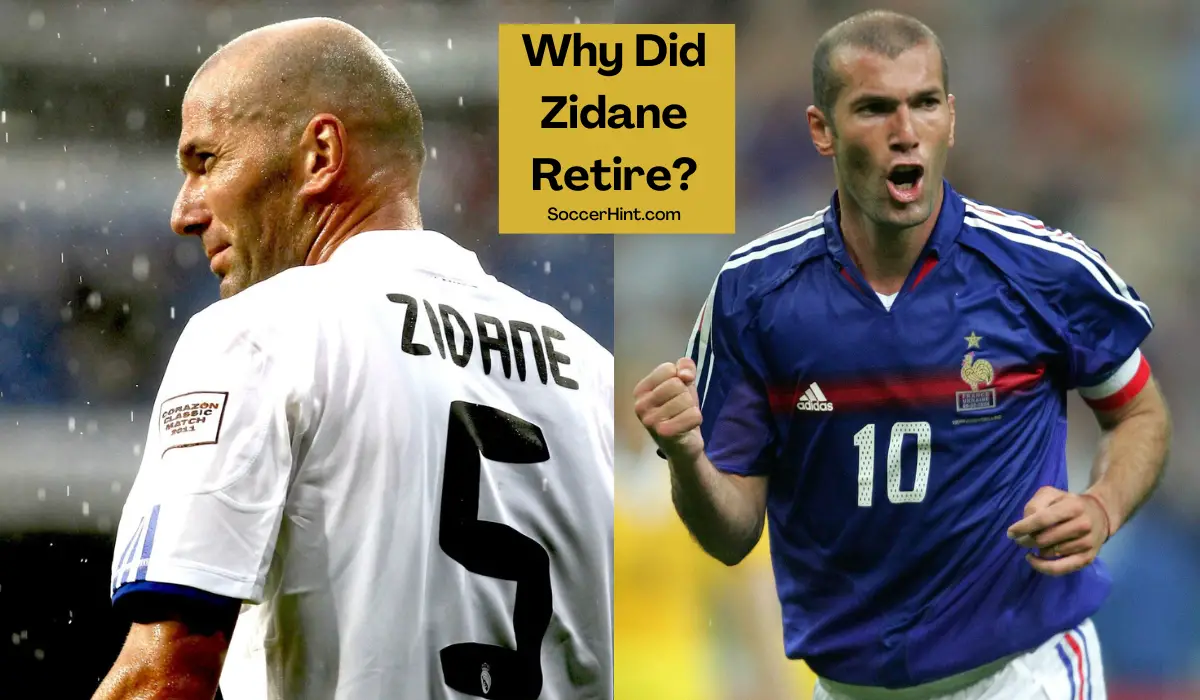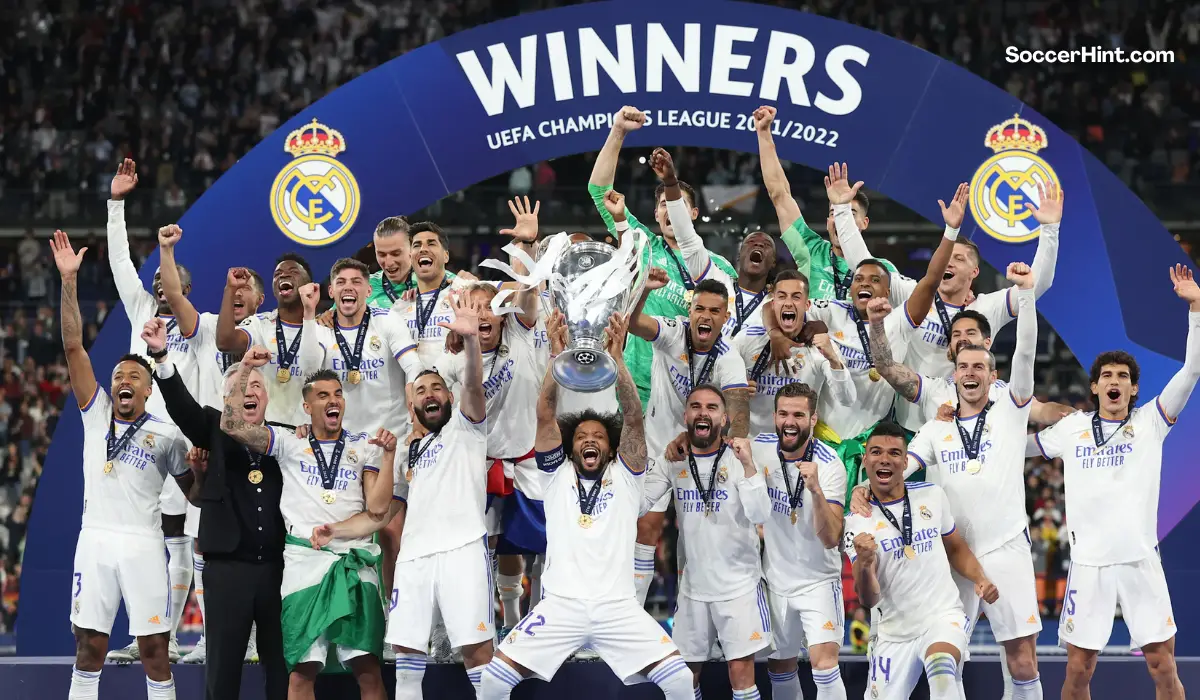In the annals of football history, few names evoke as much reverence and admiration as Zinedine Zidane. A maestro on the pitch, Zidane’s artistry and vision graced the game for years, leaving an indelible mark on the sport. However, the zenith of his career was met with a solemn announcement that reverberated through stadiums worldwide – Zidane, the iconic playmaker, had decided to retire from professional football. This article unravels the intricate layers surrounding the main reason why Zidane retired, shedding light on the circumstances, his illustrious career at Real Madrid, and the pivotal question that lingered in the air – Why did Zidane retire?
(Did you know that Real Madrid Have Never Won A Treble?)
Zidane’s Retirement Details
Zidane’s retirement marked the end of an era, a moment when the footballing world bid farewell to a legend at the age of 34. The French maestro, donning the iconic white jersey of Real Madrid, had already left an indelible mark on the sport.
At the time of his retirement, Zidane’s trophy-laden career included three FIFA World Player of the Year awards and a Ballon d’Or. In addition, he’d won the World Cup with France and the Champions League. His impact at Real Madrid, where he played a pivotal role in securing numerous domestic and international titles, further solidified his status as one of the greatest to ever grace the pitch.
Zidane’s contribution to Real Madrid extended beyond the tangible silverware. His elegant style, precise passes, and ability to control the tempo of a game endeared him to fans globally.
The Santiago Bernabéu bore witness to moments of magic orchestrated by Zidane, moments that transcended the boundaries of mere athleticism and entered the realm of artistry. His retirement was not just the exit of a player; it was the departure of a footballing legend, leaving fans and pundits alike grappling with the void he would leave behind.
(Do you know why Real Madrid is Called Los Blancos?)
The Announcement
Zidane delivered his impending retirement with characteristic poise and clarity. In an interview with French television channel Canal+, he left no room for speculation, stating unequivocally, “It’s my decision and it’s final.” The timing of the announcement, just before the World Cup, added a layer of intensity and anticipation to the revelation. Zidane’s desire to ensure that people were informed before the tournament underscored his commitment to transparency, setting the stage for a farewell that would be as graceful as his illustrious career.
The declaration that the World Cup would be his final goal resonated deeply with football fans. Zidane, ever the competitor, was setting his sights on one last hurrah, a final chapter in a storied career. The mere mention of the World Cup, the pinnacle of international football, elevated the significance of his impending retirement.
| Career Statistic | Number |
|---|---|
| Total Appearances (Club and Country) | 789 |
| Total Goals | 126 |
| Club Trophies Won | 10 |
| International Trophies Won | 2 |
| FIFA World Player of the Year Awards | 3 |
| Ballon d’Or Awards | 1 |
Read Also: Why Is Ballon d’Or Award Given?
Why Zidane Retired
As Zidane revealed why he Zidane retired, he pointed to the demanding nature of contemporary football. “The past two years I haven’t been on top form, and that’s no good when you play at a club like Real,” he admitted. This candid acknowledgement of his physical condition highlighted the toll that age and the relentless pace of the sport had taken on him. Zidane, at the age of 34, found himself at a juncture where the rigours of professional football were becoming increasingly formidable.
“I’m at an age when it’s more and more difficult every year. I don’t want to spend another year like last year or even the last two years,” Zidane declared, offering a glimpse into the internal struggles that had accompanied his decision.
The admission of not being at the peak of his form, particularly in the context of a club as demanding as Real Madrid, reflects the high standards to which he held himself throughout his illustrious career.
The Shift in Stance
Zidane’s decision to retire after the 2006 World Cup marked a departure from his earlier foray into retirement announcements. Notably, he had previously declared his retirement from international football after Euro 2004, only to later rescind that decision.
This time, however, Zidane’s resolve seemed unshakeable. “The context was different then. This is definitive. I’m stopping everything,” he declared. The evolution of his stance on retirement hinted at the profound considerations and reflections that had guided his decision-making process.
Legacy Beyond the Numbers
Beyond the statistical achievements and numbers, Zidane’s legacy was shaped by moments of brilliance that etched themselves into the collective memory of football enthusiasts. His iconic goals, jaw-dropping assists, and the infamous headbutt in the 2006 World Cup final against Italy added layers of complexity to his narrative. Zidane’s impact extended to the very soul of the game, influencing a generation of players who sought to emulate his grace and finesse on the field.
Conclusion
In conclusion, Zinedine Zidane’s retirement was a watershed moment in the narrative of footballing legends. The depth of his impact on the sport, his unparalleled skills on the pitch, and the sheer elegance with which he conducted himself created a legacy that transcended the boundaries of time. Zidane’s retirement, though tinged with a sense of melancholy, was a testament to his self-awareness and the unyielding standards he set for himself.
The question that echoed through stadiums and living rooms alike was – Why did Zidane retire? – Zidane simply retired because he was not performing well in the standard he would have liked and he was not able to deal with the intensity and physicality of the game at age 33.
All the same, as football fans, we are grateful to have watched the best of Zidane. Interestingly, he turned out to be a great coach for Real Madrid. What a man!





